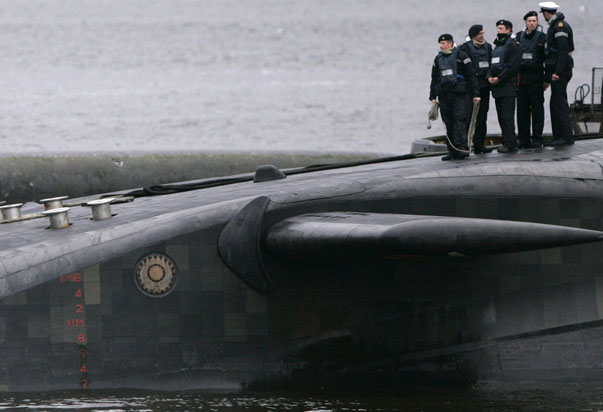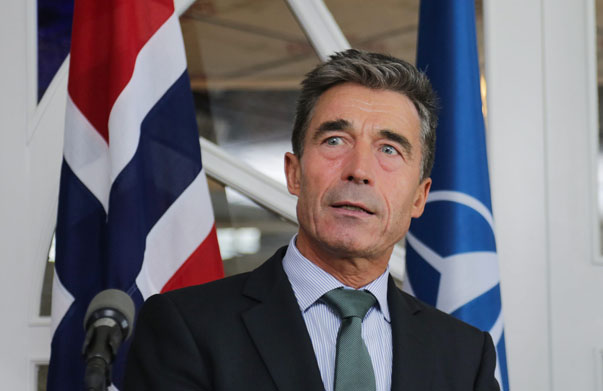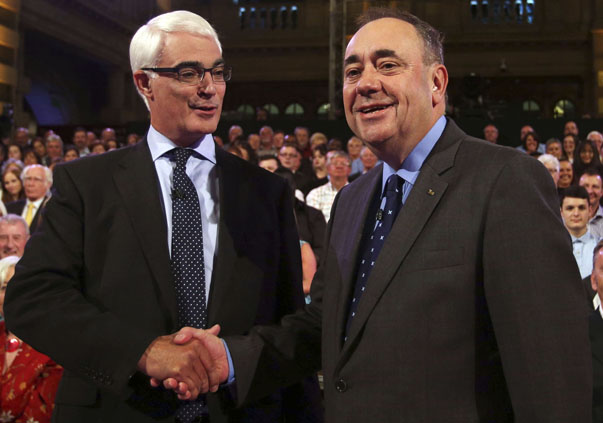Britain has about 160 “operationally available” nuclear warheads, each one capable of killing more than 1 million people.
Scotland is at the heart of the UK’s atomic weapons programme, with the fleet of Vanguard-class submarines based at the Clyde naval base.
The Scottish National Party (SNP), currently heading the campaign for a yes vote in the independence referendum on 18 September, says the Trident would have no place in an independent Scotland.
But the party also wants to be a member of Nato, a military alliance committed to maintaining a nuclear deterrent.
In last night’s televised debate with the pro-union campaign leader Alistair Darling, SNP leader and Scottish First Minister Alex Salmond brushed aside the apparent difficulties of the party’s position.
What do the experts say?
Decommissioning Trident
The SNP has said that it wants to see Trident weapons expelled from the Clyde within five years of a yes vote – setting a deadline of 2020 to close the nuclear weapons facilities.
The defence think tank RUSI published this report on the difficulties of safely dismantling the Trident programme earlier this month.
Mr Salmond suggested that it partly backed his stance, saying: “They (RUSI) actually argued that to move Trident, it would be possible within the time-frame of five-and-a-half-years, but they said that Coulport, that’s the weapons establishment, would take longer… they said you could move Trident in that timescale.”
It’s hard to see how Mr Salmond can arrive at this interpretation of the RUSI paper, which doesn’t in fact mention any support for the SNP time-frame.
Quite the opposite: the author, Professor Malcolm Chalmers, says pretty clearly that Scotland will not be rid of nuclear weapons until 2028 – a full eight years after the 2020 deadline.
Prof Chalmers writes: “A vote for independence could be followed by a jointly commissioned study for relocation options, with a view to establishing an agreed baseline for subsequent decisions.
“Such a study is highly unlikely to suggest that relocation could be carried out safely by the 2020 target suggested by the Scottish government…
“This relocation programme could not be completed by the 2020 target date currently envisioned by the Scottish government, and linking relocation to a specific date would likely hinder rather than help its completion.”
Other experts have put the possible time-frame for relocating Trident from a few months to 20 years, but you have to look very carefully at the context of their remarks to understand what that means.
On a purely technical level, top military officers have said Britain could move Trident out of Scotland in months, but that would not leave the UK enough time to build an alternative facility.
It’s unlikely that an independent Scotland would want to antagonise the UK or Nato by putting its neighbour in that kind of position.
Joining Nato
The SNP opposed joining Nato for 30 years before changing its policy in 2012.
Initially the party stated that Scotland would inherit its treaty obligations after voting to leave the UK, and said it wanted to “maintain Nato membership” without going back on the promise to expel Trident.
International law experts begged to differ, and Nato has repeatedly said that an independent Scotland’s membership would not continue after a split from the UK. Scotland would have to apply for membership.
Last week the alliance’s secretary general Anders Fogh Rasmussen said: “I am not going to interfere at all with a campaign leading up to the referendum in Scotland, but I can inform you about procedures and the facts.
“In case that Scotland voted in favour of independence then Scotland would have to apply for membership of Nato as a new independent state. A decision on accession would have to be taken by unanimity, by consensus, as always in Nato.”
Would Nato want Scotland if it opposes Trident?
Various critics have said that Nato would not want Scotland as a member if it opposed nuclear weapons.
But as Mr Salmond said last night, many Nato members are nuclear weapons-free themselves. The truth is complicated.
Nato’s “strategic concept” – a statement of its core principles – says that “as long as there are nuclear weapons in the world, Nato will remain a nuclear Alliance”. Members sign up to a strategy based on “an appropriate mix of nuclear and conventional capabilities”.
So there seems to be a basic contradiction in a country opposed to nuclear weapons trying to join a nuclear military alliance.
In practice, most members do not have warheads themselves and some, like Norway, have managed to maintain their membership while refusing to host weapons on behalf of the nuclear powers.
But a country actively making it harder for a fellow member state to maintain its own nuclear deterrent would be in a unique position.
Would Scotland really be free of weapons?
For Scotland to be genuinely free of nukes, presumably it would have to refuse entry to its waters to nuclear-armed ships from its allies.
The Scottish government’s position on this is slightly ambiguous.
Its website states: “It is our firm position that an independent Scotland should not host nuclear weapons and we would only join Nato on that basis.
“While the presence of nuclear weapons on a particular vessel is never confirmed by any country, we would expect any visiting vessel to respect the rules that are laid down by the government of an independent Scotland.
“While they are both strong advocates for nuclear disarmament, both Norway and Denmark allow Nato vessels to visit their ports without confirming or denying whether they carry nuclear weapons. We intend that Scotland will adopt a similar approach as Denmark and Norway in this respect.”
Does this mean that the Scottish government would effectively turn a blind eye to its nuclear neighbours using Scottish ports? If nothing is ever confirmed or denied, we’ll never know.






